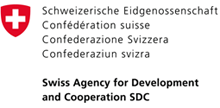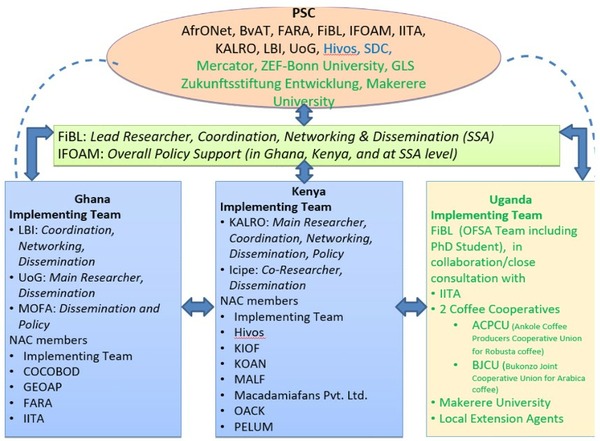About ProEcoAfrica and OFSA
Background
Ecological organic agriculture (EOA) practices are increasingly being recognized as important to improving food security in Africa, especially in challenging environments for the smallholder sector. Recent studies provide some evidence that EOA can be more profitable and more sustainable in the long term than do most conventional production systems. The African Union (AU) Heads of State and Government Decision in 2011 on organic farming (also referred to in Africa as EOA) underscores the growing recognition of the positive role played by EOA in addressing food insecurity and poverty in Africa. Following this high-level decision, an EOA Initiative has been developed aiming to mainstream the EOA-practices into national policies, plans and strategies by 2025. Despite the availability of some evidence, solid data on the benefits of EOA practices and systematic information on their drawbacks in Africa are still lacking for many contexts. As a result many farmers, advisors, scientists and government officials are still uncertain on whether EOA can markedly improve yields and significantly help to reduce production gaps and increase farm profits in Africa compared with high-input agriculture systems. Comparative research of EOA and conventional farming systems is therefore urgently required to address these data and knowledge gaps and evaluate the sustainability of such systems. ProEcoAfrica will generate scientific evidence on the productivity and profitability of ecological organic agriculture while OFSA will complement this evidence with sustainability aspects of the systems.
Development Goal
The ProEcoAfrica, OFSA as well as PMSA Kenya and Nutridecisions projects contribute to improved rural livelihoods, including food, nutrition and income security, in sub-Saharan Africa (SSA) through climate-smart intensification of agricultural systems.
Project Purpose
In close alignment to EOA and in close consultation with EOA stakeholders, the continental research forum, international research institutions and universities, ProEcoAfrica, OFSA and Nutridecisions are generating scientific evidence and knowledge on the productivity, profitability and sustainability of EOA in comparison to conventional systems in Ghana, Kenya and Uganda (for OFSA). Sound conclusions and recommendations will be drawn on the potential of EOA to help farmers, especially women, to be more economically successful and resilient to the adverse impacts of climate change and socio-economic challenges. PMCA Kenya is contributing towards market access and income generation from organic agriculture.
Expected Outcomes
- Outcome 1: Increased availability of scientific and sound evidence on the potential of intensified organic agriculture to improve and sustain the incomes and food and nutrition security of smallholder farming households.
- Outcome 2: Organic practitioners have increased capacity and knowledge for effective promotion of innovative organic agriculture practices through use of research information.
- Outcome 3: Policies towards ecological organic agriculture are supported at national, sub-regional and regional levels through the EOA Initiative. Smallholder farmers in sub-Saharan Africa will benefit from suitable policies in support of sustainable agriculture.
Project Beneficiaries from ProEcoAfrica and OFSA
ProEcoAfrica and OFSA findings are expected to facilitate decision making and practice by farmers, extension agents, research and development organizations, academic institutions, and national and regional ecological organic networks, as well as public and private policy and decision makers in Sub Saharan Africa. For OFSA, the private sector and those in food supply chains are also key targets.
Project Timeframe
- ProEcoAfrica: 2013 to 2017
- OFSA: 2016 to 2020
- Nutridecisions: 2019 to 2021
- PMCA Kenya: 2019 to 2021
 This website was archived on December 2, 2022 and is no longer updated.
This website was archived on December 2, 2022 and is no longer updated.





